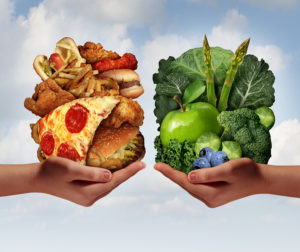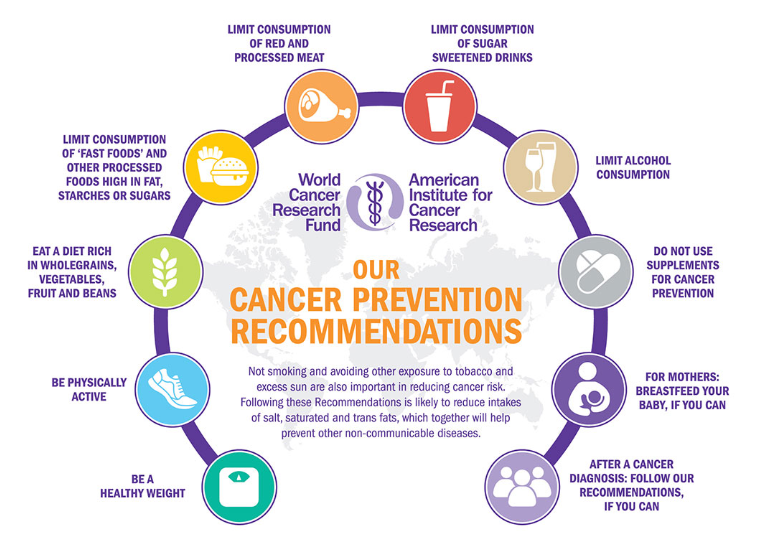Cancer prevention and awareness events are now happening almost every month. In September the cancer  prevention theme centered on prostate cancer. For the current month of October, it’s all about breast cancer.
prevention theme centered on prostate cancer. For the current month of October, it’s all about breast cancer.
Over the last 20 years there have been a lot of resources invested into cancer prevention and treatment programs.
But what if the answer to the cure for cancer was as simple as what you eat?
How would that change your view of food?
This blog post will address the importance of your diet. Hopefully helping you take a significant step towards reducing your risk for cancer and improving your overall health.
Almost 11 years ago on October 31, 2007, ABC News showed a special segment on Good Morning America (GMA). It dealt with diet, weight, alcohol, red meat consumption, and the risk for cancer.
Additionally, the GMA website provided information regarding cancer prevention. The following is a direct quote:
“After five years of reviewing 7,000 medical studies, a team of top scientists from around the world has concluded that diet and weight directly affect whether you’ll get cancer.
“The researchers cite ‘convincing’ evidence that excess body fat can cause six different types of common cancers, including those affecting the breast, bowel, and pancreas.”
The information GMA presented examined the potential link between diet and cancer. However, they missed a critical factor. It’s a connection that is rarely talked about in the general media but is important in your overall wellness and cancer prevention.
First Observation for Cancer Prevention!
When you examine the contents from ABC News one of the primary observations is:
Your Diet and Weight Directly Affect Your Risk for Cancer!
What you eat, and how you pack on the pounds, will influence your risk for cancer. According to Colleen Doyle, director of Nutrition and Physical Activity for the American Cancer Society:
“In a survey we did last year, over 80 percent of respondents connected excess weight to heart disease risk, over 57 percent connected it to diabetes, but less than 10 percent connected being overweight to cancer risk. With the science so strong on this issue, the trends on weight so bad, and the awareness that what you weigh impacts cancer risk so low. This is an important message – – that people do indeed have some control over developing many types of cancer.”
There are two key points from the above quote.
Key #1 – Although people connect excess weight with heart disease and diabetes, few connect it to cancer prevention.
Key #2 – You have “some control over developing many types of cancer.”
In fact, you have more control than you realize! Your body produces new cells every day. You replace about 1% of your cells each day. That means 1% of your body is brand-new today, and you will get another 1% tomorrow. You choose whether those new cells will be nourished properly or poorly. You choose whether you will have healthy and vibrant cells that act young. Or, sickly and sedentary cells that act old.
Second Observation for Cancer Prevention!
The study that was referred to by ABC News is the World Cancer Research Fund/American Institute for Cancer Research Expert Report entitled:
Food, Nutrition, Physical Activity and the Prevention of Cancer: a Global Perspective
You can find an update to this comprehensive report by clicking here where it is stored in a PDF file for viewing.
According to this report “5 to 10% of cancers result directly from inheriting genes associated with cancer.” This means that nutrition, lifestyle, and environmental factors account for the remaining 90 to 95% of cancers.
We keep spending millions of dollars every year on finding the cure to cancer when the most important cure is staring us in the face. It’s the food we eat!
Think about it.
If 90% of cancers are nutrition, lifestyle, and environmentally induced, then what would happen if people made the necessary changes to remove these factors from the equation?
Even if you were only 50% successful, the 11 million people diagnosed with cancer every year would drop to approximately 5 million. The 7 million who annually die from cancer would drop to approximately 3 million. That’s significant!
Third Observation for Cancer Prevention!
The report from the World Cancer Research Fund/American Institute for Cancer Research produced the following image

Of their 10 Recommendations, 7 center on food and lifestyle:
-
Be a Healthy Weight
-
Be Physically Active
-
Eat a Diet Rich in Whole Grains, Vegetables, Fruit, and Beans
-
Limit Consumption of “Fast Foods” and Other Processed Foods High in Fat, Starches, or Sugar
-
Limit Consumption of Red and Processed Meats
-
Limit Consumption of Sugar Sweetened Drink
-
Limit Alcohol Consumption
Contained in the above 7 recommendations is an important key that goes unnoticed by most of the news media and health profession, especially as it relates to cancer prevention. This key is directly found in 5 of the 7 recommendations. What is this key?
Understanding how the food you eat and drink directly affects your body’s pH!
If fact, some would consider your body’s pH the single most important item to pay attention to for both optimal health and the prevention of diseases like cancer.
Some organs and organ fluids (like the gastric region) have a higher or lower pH than what is normal for the body. However, your body functions best when the pH of the internal biochemical environment (your blood, lymph and intracellular fluids) is between 7.365 and 7.390.
If you understand the pH scale, then you can see that the body likes to keep itself slightly alkaline and in a very narrow range.
Anything outside this range causes stress on the body. The farther outside this range, then the stress on the body goes up exponentially. Although a person may occasionally have alkalosis (a reading higher than 7.390), most people lean toward acidosis because of the food they eat.
When food is metabolized or “burned” in our body it leaves an “ash”. This food ash will be neutral, acidic, or alkaline depending largely on the leftover mineral composition of the food. Although the following list is not complete, it will give you a general idea of which foods leave behind an acidic or alkaline environment:
-
Acidic Foods: corn, canned fruits, cranberries, most grain and grain products, most beans & legumes, milk, peanuts, peanut butter, most animal proteins, tuna, most fats and oils, sugar, artificial sweeteners, alcohol, catsup, cocoa, and aspirin.
-
Alkalizing Foods: water, most vegetables, most fruits especially if they are low sugar, almonds, fermented tofu, whey protein, all herbs and many spices, soured dairy products, probiotic cultures, bee pollen, and juices that are green, veggie or fresh fruit.
-
Super Acidifying Food: Coca-Cola – pH 2, Beer – pH 2.5, Coffee – pH 4
-
Super Alkalizing Minerals: Potassium – pH 14, Sodium – pH 14, Calcium – pH 12, Magnesium – pH 9
When you examine the recommendations made by this cancer study you see that 4 recommendations are to avoid acidic producing foods (eliminate or reduce energy-dense foods, sugary drinks, red meat, processed meat and alcohol) and 1 recommendation is to increase alkaline producing foods (eat mostly foods of plant origin).
The study’s 1st recommendation for cancer prevention is to limit body fat which is directly related to diet. Most overweight and obese people didn’t get that way by consuming too many fruits and vegetables. Instead, the standard American diet of animal protein with a refined grain product washed down with a beer or dark cola creates a greater chance for being overweight and leads to an extremely acidic environment.
Conclusion!
This GMA feature, as well as the comprehensive report on cancer prevention, exposes a critical factor in both disease prevention and how well you age.
It’s your body’s pH!
The more acidic your body becomes the greater the opportunity for all types of diseases to take hold. The more you help your body maintain its natural alkaline state, the greater your body’s ability to fight disease and remain healthy.
I have two blog posts that will help you better understand this acid-alkaline-balance.
You have the power of choice! You have the ability to choose the food and lifestyle that will help your body prevent disease, improve your overall health, and slow down the aging process.
Most importantly, cancer prevention is directly related to your dietary choices.
Leave a Reply
You must be logged in to post a comment.